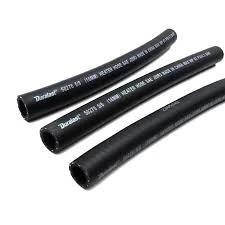Understanding Diesel Fuel Line Ratings and Their Importance in Diesel Engines
12월 . 04, 2024 14:13 Back to list
Understanding Diesel Fuel Line Ratings and Their Importance in Diesel Engines
Understanding Diesel Rated Fuel Lines Importance and Applications
In the world of diesel engines, fuel lines play a pivotal role in ensuring efficient operation and overall performance. Diesel rated fuel lines are specifically designed to handle the unique properties of diesel fuel, which is denser and more viscous than gasoline. This article explores the importance of diesel rated fuel lines, their construction, applications, and maintenance to ensure optimal function in various settings.
The Importance of Diesel Rated Fuel Lines
Diesel rated fuel lines are a critical component in any diesel-powered system, be it in vehicles, heavy machinery, or stationary engines. The design and material of these lines must withstand the characteristics of diesel fuel, which can include higher pressures and temperatures compared to gasoline. Using improper fuel lines can lead to leaks, contamination, or system failures, making it essential for these lines to meet specific industry standards.
One of the primary roles of diesel rated fuel lines is to securely transport fuel from the tank to the engine. This process involves the management of fuel flow, which is vital for the engine’s efficiency and performance. A properly functioning fuel line minimizes the risk of cavitation, ensures consistent fuel delivery, and promotes better combustion, ultimately leading to improved engine performance and lower emissions.
Construction and Specifications
Diesel rated fuel lines are typically made from materials that can withstand the chemical properties of diesel fuel. Common materials include rubber, PVC, or polyamide, with some specialized lines made from metal or composite materials for extreme conditions. These materials must resist degradation over time, which can be caused by exposure to high temperatures, pressure fluctuations, and the corrosive nature of certain diesel fuels.
When selecting diesel rated fuel lines, it is crucial to consider the line's diameter and pressure rating. The diameter affects the fuel flow rate and engine performance, while the pressure rating ensures the line can handle the dynamic conditions present within the engine system. Most manufacturers adhere to specific standards, such as SAE J30R10, which provides guidelines for the construction and performance of fuel lines.
Applications of Diesel Rated Fuel Lines
diesel rated fuel line

Diesel rated fuel lines find their place in a variety of applications. In the automotive industry, they are used in passenger vehicles, trucks, and commercial vehicles to manage fuel delivery to the engine. This is especially important in heavy-duty trucks that require reliable fuel lines capable of handling higher fuel flow rates and harsher operating conditions.
In addition to vehicles, diesel rated fuel lines are essential in agriculture, construction, and marine industries. Agricultural machinery, such as tractors and harvesters, relies on robust fuel lines to operate effectively in the field. Similarly, construction equipment and generators need durable fuel lines that can withstand tough work environments.
Furthermore, diesel rated fuel lines are crucial in stationary engines, which are often used in power generation and backup systems. In these scenarios, the reliability of the fuel line is paramount, as any failure can lead to significant downtime and financial loss.
Maintenance and Best Practices
To ensure the longevity and reliability of diesel rated fuel lines, regular maintenance is essential. Periodic inspections for signs of wear or damage, such as cracks, leaks, or corrosion, can prevent larger issues down the line. It is also advisable to replace filters and check fuel quality, as contaminated fuel can adversely affect the entire fuel system.
When installing or replacing diesel rated fuel lines, it is vital to use parts that meet or exceed original manufacturer specifications. Improperly sized or rated lines can lead to significant engine damage or performance issues.
Conclusion
Diesel rated fuel lines are an integral part of any diesel-powered system. They ensure the safe and efficient transportation of fuel while withstanding the specific challenges presented by diesel fuel. Understanding the importance of these lines, their construction, and proper maintenance can lead to improved engine performance, reduced downtime, and enhanced longevity of the equipment. As diesel technology continues to evolve, so too will the standards and innovations surrounding fuel line design and functionality.
